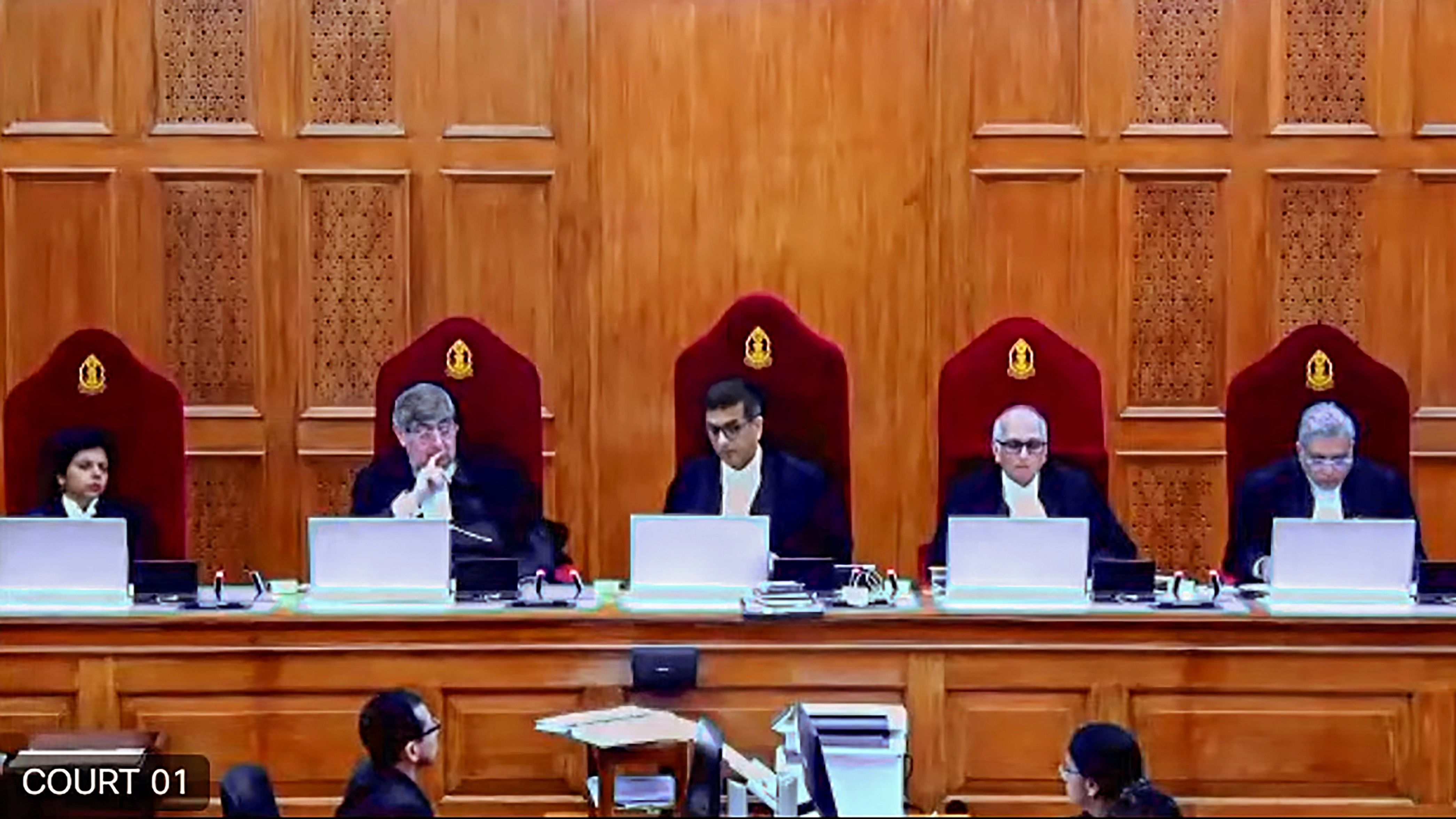
The five-judge Constitution bench comprising Chief Justice DY Chandrachud and Justices SK Kaul, SR Bhat, Hima Kohli and PS Narasimha during pronouncement of verdict on same-sex marriages.
Credit: PTI Photo
The Supreme Court on Tuesday held that law does not recognise the right to marry or have civil union for same sex couples unless the Parliament makes a law for it. The SC also refused to strike down the Special Marriage Act and Foreign Marriage Act for not recognizing queer marriages.
Here are the key takeaways from the judgment today:
Chief Justice of India D Y Chandrachud said as he began his verdict in the matter that “Courts cannot make law but can interpret and give effect to it.” There were four judgments in the case, one from him, and the others from the 5-judge bench hearing the matter.
The CJI said that to be queer is not an urban or an elite practice. “People may be queer regardless of whether they are from villages or cities.. not only an English-speaking man can lay claim to being queer…”
The CJI noted "The right to enter into Union includes the right to choose one's partner and the right to recognition of that union", adding that "Failure to recognise such associations will result in discrimination against queer couples."
Elaborating on the marriage of same-sex couples, he said that creating marriage for same-sex couples as a fundamental cannot be accepted.
The CJI added if the court holds Section 4 of the Special Marriage Act as unconstitutional, then the purpose of the progressive legislation will be lost. If it is held void it will take India back to the pre-independence era clothed in social inequality and religious intolerance and eradicating one ill at the cost of another. If words are substituted then the court will enter into the domain of the legislature. The court is not equipped to undertake this exercise and read words into the statute. judicial legislation is impermissible.
D Y Chandrachud said that whether a change in the Special Marriage Act is needed or not, it is for the Parliament to ascertain.
The CJI noted that humans live in “complex societies” and the ability to feel love and connection with one another makes us feel human. The need to share our emotions makes us who we are. These relationships may take many forms, natal families, romantic relationships etc. The need to form a family is one of the core traits of being a human. For the full enjoyment of such relationships such unions need recognition and there cannot be denial of basic goods and services. The state can indirectly infringe upon freedom if it does not recognise the same, added D Y Chandrachud. He added that though there may be “reasonable restriction on the right”, the right to intimate association needs to be unrestricted.
He noted that the freedom to choose a partner or enter a relationship will not make any sense if the state does not recognise it.
All persons including queer have the right to judge the moral qualities. These attributes are not absolute and can be regulated by the law. The meaning of liberty is to do what one wishes to do in accordance with law, the CJI added.
The court recognised that queer people and their union cannot be discriminated against, based on sexual orientation and denial of any service to them that a heterosexual couple gets would be a violation of fundamental rights. The word sex cannot be read without social and historical contexts. Restriction to their union based on sexual orientation will be a violation of Article 15 of the constitution.
Shedding light on the marriage of a transgender, the CJI said, “if a transgender person wishes to marry a heterosexual person such marriage will be recognised as one would be man and another would be woman, transgender man has the right to marry a woman, transgender woman has the right to marry a man and transgender woman and transgender man can also marry and if not allowed it will violate the transgender act.”
Commenting on the Central Adoption Resource Authority (CARA), the CJI noted that CARA regulation 5(3) discriminates between partners in atypical unions. It will disproportionately affect non-heterosexual couples and thus an unmarried heterosexual couple can adopt but it is not the same for the queer community. The law cannot make an assumption about good and bad parenting and it perpetuates a stereotype that only heterosexuals can be good parents. Thus the regulation is held to be “violative” of the queer community. “Unmarried heterosexual couple can marry to meet the requirement but the queer person does not have the right to do so and this exclusion only reinforces the discrimination and thus CARA circular is violation of Article 15.”
State, Union, UTs shall not bar queer people to get into union to avail benefits of the state, noted CJI Chandrachud as he added a few more directives including - sensitising the public about queer rights, creating hotline for queer community, creating safe house for queer couples, ensuring inter-sex children are not forced to undergo operations, no person shall be forced to undergo hormonal therapy.
He also said the queer community should not be harassed by being called to the police station to be asked about their sexual identity. The police cannot force queer couples to return to their natal families either, the CJI directed. "Police should conduct a preliminary enquiry before registering an FIR against a queer couple over their relationship", he further said.
However, Justice Narasimha disagreed with D Y Chandrachud: “CJI locates the right to union in Article 19, 21 of the constitution. For me there is no such right in these articles. CJI recognizes tangible and intangible benefits... in other words marriage however fundamental for life does not make it fundamental and similarly with civil unions…thus I don't agree with the same.”
(With inputs from Live Law and Bar & Bench)